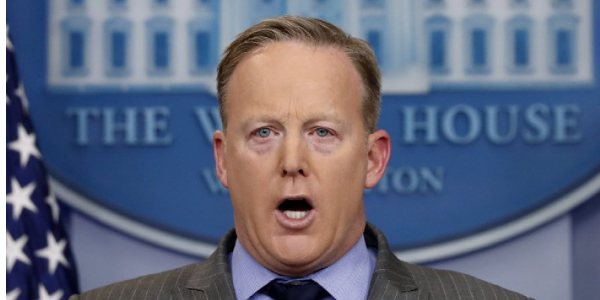
When I was a little kid, I went through a phase where I lied about things. The wisdom of the practiced
tells us that kids do this because they want attention. I paid dearly for these indiscretions as a teen --
hearing over and over and over again that if I couldn't be trusted to be honest about the little things,
I couldn't be trusted to be honest about more important matters.
Before he became the 45th President of the United States, Mr. Trump and his campaign told
fib after
fib --
and about little things. I don't recall receiving any sense of contrition about any of these, even after
irrefutable evidence of the missteps — tweets, video footage, etc. — was presented.
What I learned from this: Mr. Trump is not a man who apologizes, or acknowledges missteps of any sort —
perhaps unless there's an advantage to him in doing so.
At an early point in the race, I saw news reports,
like this article from Vanity Fair, alleging that Trump was interested in getting into
media. At the time, I didn't think much of it, other than it'd be just another money-making venture. But
over the course of the campaign, I think I figured out why he seemed so interested in the media: Mr. Trump
realizes the media has the power to project perception to the masses.
In short, media controls reality.
And if there's one thing Mr. Trump seems to adore, it's control.
Plagiarism
Remember that whole thing in late July about how Melania Trump's speech to the Republican National Convention
was lifted from Michelle Obama's speech from 2008? Yes you do.
Fast-forward to last week. Now they're plagiarizing cakes: a bakery was hired to duplicate
Duff Goldman's design for President Obama's 2013 inauguration. According to The New York Daily News
article, Buttercream Bakeshop admitted to TMZ they were asked to copy Goldman's design.
What was the phrase? "Immitation is the sincerest form of flattery", right?
You know, companies copy successful brands all the time. Similar fonts. Similar colors. They want the
consumer to confuse their brand with the most successful one to bolster sales. If more examples of
"flattery" surface, one might begin to wonder if we're witnessing brand strategy.
"Alternative Facts"
On day ONE of the Trump Administration, Press Secretary Spicer basically banged his fist on the podium
and insisted that the Trump Inauguration was the most well-attended presidential inauguration EVAR.
He did this knowing full well that the media was showing comparison photos of the National Mall of the
Trump inauguration crowds and the crowds in 2009 of the Obama inauguration. The difference is pretty
clear.
"Spicer earns Four Pinocchios for false claims on inauguration
crowd size ", jeered The Washington Post.
Senior Advisor KellyAnne Conway defended Spicer's statement on
NBC's "Meet the Press" on Sunday, telling host Chuck Todd that Spicer had presented
"alternative facts". (See also: NBC News, The New York Times, The Washington Post.)
If the Trump Administration is willing to make the press secretary lie to the world about something as
inconsequential as attendance at the inauguration, then why would I ever trust anything the administration's
press secretary has to say in the future?
In researching this, I found an interesting twitter post which suggests the whole thing
was a calculated move designed in part to discourage us from participation in the political process.
I suppose issuing an edict declaring that the sky is purple and refusing to take questions is one way to
do it. Another might be to simply not make a statement at all.
In retrospect, it's probably a better statement to make.